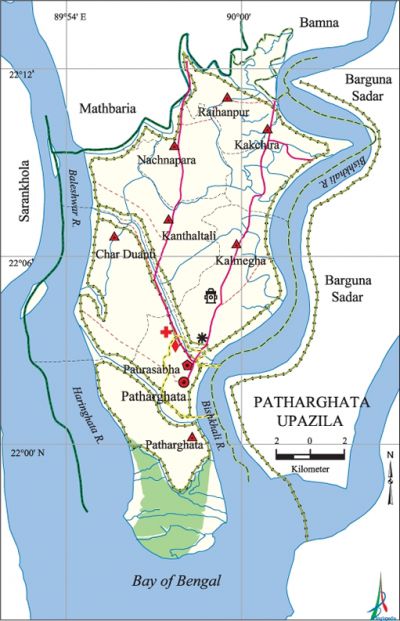Patharghata Upazila
Patharghata Upazila (barguna district) area 387.36 sq km, located in between 22°14' and 22°58 north latitudes and in between 89°53' and 90°05' east longitudes. It is bounded by mathbaria and bamna upazilas on the north, bay of bengal on the south, barguna sadar and the bishkhali river on the east, sarankhola upazila and the Haringhata river on the west.
Population Total 163927; male 80544, female 83383; Muslim 146863, Hindu 17031, Buddhist 1, Christian 31 and others 1.
Water bodies Main rivers: Bishkhali, Haringhata, Baleshwari.
Administration Patharghata thana, now an upazila, was formed in 1925.
| Upazila | ||||||||
| Municipality | Union | Mouza | Village | Population | Density (per sq km) | Literacy rate (%) | ||
| Urban | Rural | Urban | Rural | |||||
| 1 | 7 | 42 | 66 | 28521 | 135406 | 423 | 67.4 (2001) | 59.3 |
| Municipality | ||||||||
|
Area (sq km) |
Ward |
Mahalla |
Population |
Density (per sq km) |
Literacy rate (%) | |||
| 13.11 (2001) | 9 | 9 | 17177 | 1089 (2001) | 72.5 | |||
| Upazila Town | ||||||||
|
Area (sq km) |
Mouza |
Population |
Density |
Literacy rate (%) | ||||
| 13.95 (2001) | 3 | 11344 | 455 (2001) | 56.6 | ||||
| Union | ||||
| Name of union and GO code | Area (acre) | Population | Literacy rate (%) | |
| Male | Female | |||
| Patharghata 71 | 12521 | 14242 | 14249 | 57.6 |
| Kalmegha 35 | 12431 | 12595 | 13299 | 53.6 |
| Kakchira 23 | 6519 | 10158 | 10562 | 60.5 |
| Raihanpur 83 | 6114 | 7014 | 7796 | 58.8 |
| Char Duanti 11 | 8921 | 12247 | 12316 | 54.2 |
| Kanthaltali 47 | 5793 | 9536 | 10252 | 67.5 |
| Nachna Para 59 | 5551 | 6115 | 6369 | 67.4 |
Source Bangladesh Population Census 2001 and 2011, Bangladesh Bureau of Statistics.

War of Liberation The Pak army entered the Patharghata upazila on 15 May 1971 and they vandalized many villages including Daharpur, Badurtala and Kokila, which created panic in the area. Freedom fighters did resist the enemy forces and had some successes at places. But there had been no direct fight between the freedom fighters and Pak army in the upazila.
For details: see পাথরঘাটা উপজেলা, বাংলাদেশ মুক্তিযুদ্ধ জ্ঞানকোষ (Encyclopedia of Bangladesh War of Liberation), বাংলাদেশ এশিয়াটিক সোসাইটি, ঢাকা ২০২০, খণ্ড ৫।
Religious institutions Mosque 443, temple 56.
Literacy rate and educational institutions Average literacy 60.5%; male 60.3%, female 60.6%. Educational institutions: college 3, secondary school 24. Noted educational institution: Patharghata KM Secondary School (1929).
Newspapers and periodicals Regular: Sangkalpa, defunct: Patharghata Barta.
Cultural organisations Library 1, club 35, women organisation 7, cinema hall 5.
Main sources of income Agriculture 60.3%, non-agricultural labourer 3.87%, industry 0.55%, commerce 15.88%, transport and communication 2.21%, service 6.42%, construction 1.46%, religious service 0.19%, rent and remittance 0.25% and others 8.87%.
Main crops Paddy, potato, khesari, mug, vegetables.
Extinct or nearly extinct crops Sweet potato, futi, water melon, sesame, tobacco.
Main fruits Jackfruit, papaya, banana, pineapple, lemon.
Fisheries, dairies and poultries Fishery 61, dairy 6, poultry 10.
Communication facilities Roads: Pucca road 67 km, semi-pucca road 47.39 km, mud road 274 km; waterway 82 km.
Extinct or nearly extinct traditional transport Palanquin.
Noted manufactories Saw mill, rice mill, ice factory, welding factory.
Cottage industries Goldsmith, blacksmith, embroidery, cane work, bamboo work.
Hats, bazars and fairs Hats and bazars are 16, most noted of which are Patharghata Bazar, Kakchira Bazar, Rupdan Bazar, Haringhata Bazar, Char Duanti Bazar.
Main exports Paddy, hilsha fish, shrimp.
Access to electricity All the wards and unions of the upazila are under rural electrification net-work. However 31.0% of the dwelling households have access to electricity.
Sources of drinking water Tube-well 49.8%, tap 6.4% and others 43.8%.
Sanitation 77.7% of dwelling households of the upazila use sanitary latrines and 21.2% of dwelling households use non-sanitary latrines; 1.1% of households do not have latrine facilities.
Health centres Upazila health centre 1, union health and family planning centre 5, clinic 1.
Natural disasters About 400 people were victims of the tidal bore of 12 November 1971 and the tornado of 17 September 2006; these natural disasters also caused heavy damages to settlements, crops, livestock and other properties of the upazila.
NGO activities Operationally important NGOs are brac, proshika, asa, caritas. [Safiuddin Ahmed]
References Bangladesh Population Census 2001 and 2011, Bangladesh Bureau of Statistics; Cultural survey report of Patharghata Upazila 2007.
